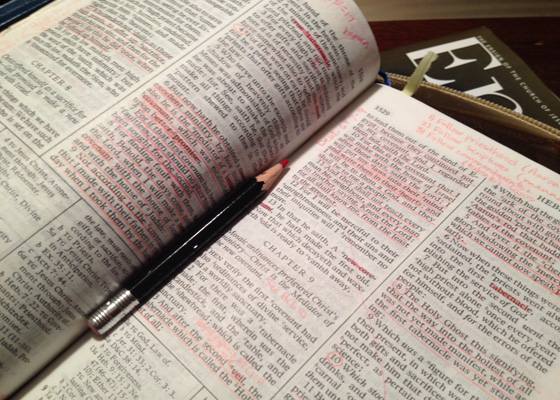
I’m going through the Book of Mormon at a slower pace than the Sunday School Class. I just got a new set of scriptures and I am working my way through, underlining my favorite passages and adding my personal notes as I go. Can I just quickly testify to you that the words of this marvelous book are true and touch my very soul so that I weep with joy when I thank my Heavenly Father for them? I am ever-learning so much.
Typically, I’m a slow learner. I’m very visual and sometimes it takes a while for me to make connections or see something for what it really is. But enough about me.
Once, when I was introducing S. Michael Wilcox at a fireside, I said he was like a flower. He opens layers of the scriptures little by little, teaching us how to discover the words of the Lord for ourselves. This idea has allowed me to learn different levels of the scriptures. I don’t have to worry that I’m not learning everything all at once. I’m learning little by little, as I understand more and more. But I find that I really do love discovering deeper levels of meaning. And it’s pretty exciting when I can discover them on my own, as opposed to having a master teacher point them out to me. There’s a satisfaction at personally discovering the Lord, having a one-on-one with Him, hearing Him talk to ME.
I’ve just finished the Small Plates. Sadly, these record-keepers are a somewhat pathetic lot. I say “somewhat,” because there is good mixed in with bad examples here. First, we have Enos, a good man. Not necessarily a leader, king, or prophet. Just a hunter finding His way back to God; a lot like we are. His lesson of prayer is actually quite helpful to us readers.
Then we have Jarom. We really don’t know whether he is righteous, lazy, indifferent, or wicked. But the fact that he announces he is writing this record for the purpose of keeping a genealogy gives us a clue that he may not have a firm grasp of his testimony. (Enos tells us in great detail that his father taught him the things of the Lord, and he was to write more about these things. Genealogy was important, but secondary.) Further, Jarom states that his fathers have written enough about the prophecies and revelations; he doesn’t really have much to add. Bad sign. He actually takes plenty of space telling us about the prophecies and revelations without telling us about the prophecies and revelations. When we record something, or teach, we ought to be saying something of value.
Omni is almost cocky about his wickedness. Being a record-keeper, at this time, clearly did not make you a leader of the people. In fact, this is the only place, in all of scripture, where the plates are kept by record-keepers, not kings or prophets. And notice again, he is merely keeping a genealogy record. Amaron–same thing. Chemish–same thing. Abinadom–same thing. A whole lot of years have gone by. We can only wonder at what was never recorded.
In contrast, we get Amaleki’s record. In his short space he tells us three very important events that take place in his time.
- King Mosiah finds the Mulekites.
- The Mulekites tell him about Coriantumr (the last Jaredite alive).
- Amaleki’s brother is among Zeniff’s group that resettled the City of Nephi. We will find out more about each of these groups later in the Book of Mormon, but Amaleki gives us a very good intro to these stories.
Amaleki was a righteous man. We know this because clearly he was inspired to tell us about these three incidents. Also, only he and Enos testify to us of our Redeemer.
Finally, Mormon comes along and sees the value of these Small Plates. They include the testimonies of Nephi, Isaiah, and Jacob. These are some of the greatest prophets we have ever had. He also sees Enos’ and Amaleki’s testimonies as valuable for our day. Even the other record-keepers have value. They show us what not to do, or be like, or settle for. Above all, we see the faith and obedience of Mormon, another great prophet. He was not given the reason for including these plates, but because we know “the rest of the story”, we stand in awe. (see Encyclopedia of Mormonism).
some of the greatest prophets we have ever had. He also sees Enos’ and Amaleki’s testimonies as valuable for our day. Even the other record-keepers have value. They show us what not to do, or be like, or settle for. Above all, we see the faith and obedience of Mormon, another great prophet. He was not given the reason for including these plates, but because we know “the rest of the story”, we stand in awe. (see Encyclopedia of Mormonism).
The lessons of these books, for me, are:
- Record your personal prophecies and revelations. We all have them; we just need to notice them more.
- We absolutely need to teach our children boldly. It is too easy for parents to slack off, and for children to lose sight of their own purposes.
- Listen to the Spirit of the Lord. If you don’t know how, pray–for as long as it takes–to learn how, and listen to it the remainder of your life.
- Always, always, always testify of the Savior. Record that testimony, share it with your children, speak of it often, and record it again. Testimonies can change, grow, and deepen with each new happening in our lives. Share the growth.
- Genealogy is absolutely important to connect our lives together for eternity, but testimonies preserve life, bring life, shout out about life, and eternalize life.